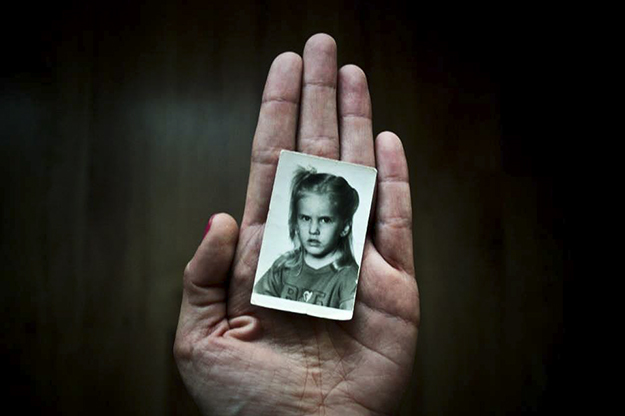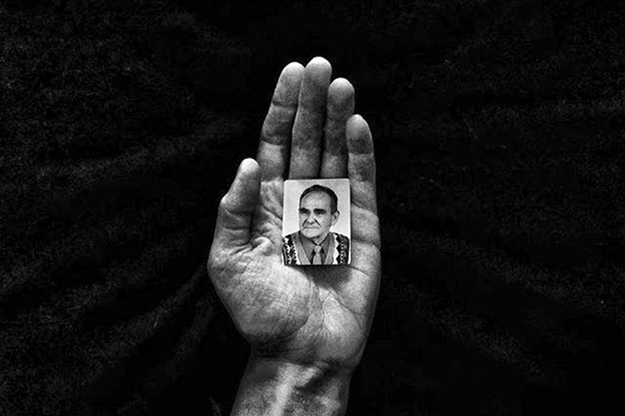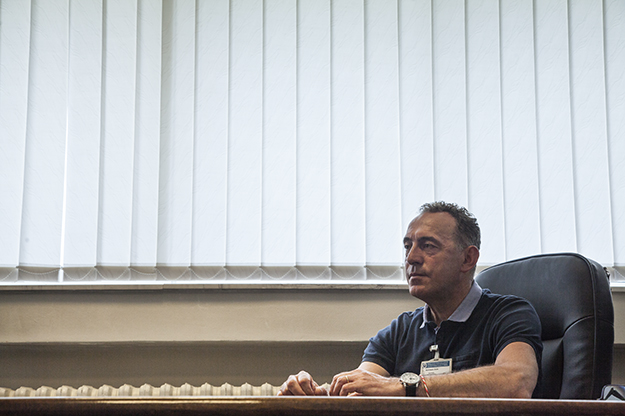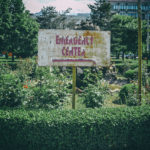Magdalena Chodownik discovered her whole family story when her grandfather, Zygmunt, revisited his childhood memories on a winter’s day six years ago. It was January 21, Grandmother’s Day in her native Poland, and the journalist was making one of her regular visits to her grandparents’ apartment in Grodzisk Mazowiecki, a town 30 kilometers southwest of Warsaw.
She clearly remembers the point at which the conversation changed, while discussing something as seemingly innocuous as school floorboards.
“Do you remember the wooden floor in your primary school, in the gym?” Zygmunt asked. She confirmed that she did. “Your great grandpa made that when he got out of Dachau.”
It was the first time she had heard her grandfather revealing how his own father was in three concentration camps during World War II after the Nazis had found out that he had been sheltering Jews in his house back in Zimna Woda village, near Lviv, in today’s Ukraine. After getting out of the notorious Dachau camp, he worked on constructing the school that Magdalena would later attend for eight years.
She was trying to comprehend her grandfather’s words and was about to ask many questions, when, within a second, he switched the conversation, asking: “Where’s the soup?”

Magdalena Chodownik found out significant details about her family’s history from her grandfather as he revisited old memories while suffering from Alzheimer’s. Photo courtesy of Magdalena Chodownik.
Magdalena and her family didn’t know it at the time, but her grandfather, who was in his 70s, was suffering from Alzheimer’s disease — an irreversible, progressive brain disorder that slowly destroys memory and thinking skills.
An individual with Alzheimer’s may forget the name of a longtime friend or what roads to take to return to a home that they’ve lived in for decades. The disease is a type of dementia, with symptoms gradually worsening over a number of years and causing brain cells to malfunction and ultimately die; with no known cure, it is considered to be terminal. In its early stages, memory loss is mild, but with late-stage Alzheimer’s, individuals lose the ability to carry on a conversation and respond to their environment.
Zygmunt would call Magdalena by different names, but early signs such as forgetting small things, places, words and names are commonly seen as normal amongst elderly people.
“When you see an older person, you see he is forgetting some stuff or inventing some stuff,” Magdalena says. “It’s not very big and you just leave it. And it gets bigger and bigger, and more and more serious.”
“Sometimes he would feel lost inside the apartment and ask, ‘Just take me home, because I miss my wife.’”
Magdalena Chodownik
People affected by Alzheimer’s particularly forget information and events that they have learned more recently. But while newer memories fade, imageries of older memories often resurrect. As such, people can have a tendency to navigate through journeys and experiences of their early life.
At times, Magdalena’s grandfather would just stand up and say that he needed to go back to the army. “He would say to Grandma, ‘I won’t take long, it’s just a couple of months. I want to go back to my duty,’” she recalls. At other times he wanted to go to a previous home in a nearby city.
“Sometimes he would feel lost inside the apartment and ask, ‘Just take me home, because I miss my wife,’” Magdalena says.
In these instances, her brother would take Zygmunt for a short car ride and he would get the impression that he was going back to his home. Upon his return a few minutes later, he would greet his wife with a cheery, “Hello my wife. I’m sorry it took me too long,” as he began to lose track of the passage of time and sense of place.
Recognizing and diagnosing
Magdalena recalls how a psychiatrist would eventually pinpoint two particular events that made it clear that her grandfather wasn’t suffering just from regular dementia: He started accusing his wife of cheating on him and experiencing paranoia that somebody was stealing his money — two commonly documented behaviors of people with Alzheimer’s.
“It was crazy because my grandmother wouldn’t have had a lover at the age of 80. Every morning she had the same schedule and went to get vegetables in the market and he thought she had a lover there,” Magdalena says. “He would say that he was going to follow her and hire a photographer to go after her and take pictures.”
Then he would wake up in the morning, search for money and accuse someone of stealing the money. After doing some research and talking to people it became clear that her grandfather was suffering from Alzheimer’s.
“There’s nothing to be ashamed of. The brain is just a part of your body. If you have to treat it you just treat it, you don’t wait.”
Magdalena Chodownik
But even after coming to this realization, getting him to a psychiatric hospital was another obstacle. Magdalena recalls her grandfather as strong and proud, and resistant to any kind of medical check up. And the word psychiatrist was a taboo among her family members either.
After Zygmunt hit his head during a small fall in the garage Magdalena took the opportunity of her family being away to seek professional help for her grandfather, telling him that she was taking him for an examination of his head.
“I cannot believe that in Europe going to psychiatrist is still a taboo — this is so stupid,” she says. “There’s nothing to be ashamed of. The brain is just a part of your body. If you have to treat it you just treat it, you don’t wait. It doesn’t make sense.”
Research shows, however, that there is still a widespread stigmatization around Alzheimer’s, in part due to the lack of public awareness and understanding of the disease; this prevents people from seeking medical treatment when symptoms are present, receiving an early diagnosis and ultimately living the best possible quality of life.

As her grandfather, Zygmunt, became increasingly disorientated, Magdalena tried to find small ways of keeping him feeling connected and secure. Photo courtesy of Magdalena Chodownik.
The little things
In Kosovo, where conversations on many diseases are met with stigmatization, the lack of awareness around Alzheimer’s can be even more apparent.
Blerta Aliu experienced this first hand after her own grandmother was diagnosed with Alzheimer’s Disease a decade ago. She recalls how on one occasion, while spending time in the middle of a busy restaurant, her grandfather felt deeply uncomfortable when people started staring and mocking his wife. In order to avoid this, she says that they now tend to choose more intimate spaces during family gatherings outside of the house.
Blerta empathizes with Magdalena’s experience of seeing a close relative suffering from the disease as she too has felt the emotional impact of slowly losing a loved one. She recalls how it all started with her grandmother forgetting little details and losing her assurance in completing daily tasks, which initially didn’t seem like a major cause for concern. At times, her grandmother would say that she wasn’t sure if she had left the stove on, or the door open, or she would forget her keys.
Then, one day, she didn’t recognize Blerta or any of her other grandchildren anymore.
A debilitating disease
Alzheimer’s Disease is named after the German doctor, Alois Alzheimer, who first identified the core traits related to the disease.
During the course of Alzheimer’s, proteins build up in the brain to form structures called ‘plaques’ and ‘tangles.’ This leads to the loss of connections between nerve cells, and eventually to the death of nerve cells and loss of brain tissue. People with Alzheimer’s also have a shortage of certain important chemicals that help to transmit signals around the brain.
The greatest known risk factor is increasing age, with the majority of people with Alzheimer's aged 65 and above. But early-onset Alzheimer's can also strike people who are as young as in their 20s. Those with Alzheimer's live an average of eight years after their symptoms become noticeable to others, but survival can range from four to 20 years, depending on age and other health conditions.
Alzheimer’s is a form of dementia, a condition that close to 50 million people worldwide are estimated to have been living with in 2017. Globally, someone develops dementia — with Alzheimer’s being the most common form — every three seconds.
Years later, the shock and the pain is still raw. “She used to say that she hoped not to see herself become very old,” Blerta says, emotionally. “It seems that her wish has been fulfilled, as she is now unaware of her old age.”
Before suffering from Alzheimer’s, Blerta remembers her grandmother as energetic and loud, as somebody with a temper, pedantic and obsessed with looks. Although she no longer recognizes Blerta, her grandmother still smiles everytime Blerta is wearing nice clothes.
“It’s this aesthetic part she has always been keen on, that she still hasn’t forgotten, but she forgets every recent conversation she has had with somebody,” Blerta says, smiling but teary at the same time.
Blerta’s family have ensured that her grandmother has kept her daily routine throughout the time she has been suffering with Alzheimer’s. They bring a hair and nail stylist to the house to help her feel made up and looking good, in the same way she always tried to before developing the disease.
Magdalena also found her own particular way of helping her grandfather, while doing something for herself.
Soon after Zygmunt was diagnosed with Alzheimer’s and had started to receive treatment from neurologists, psychiatrists and other physicians that temporarily alleviated some of the symptoms and slowed down the disease’s progression, Magdalena started to delve into her family history. She sought out information and archives in various European cities to find out more about her great grandfather’s house and to verify Zygmunt’s tales of his father having protected Jews.
“That’s why I decided to go on with the story about the past, because I saw it was helpful for him as well,” she says. “It was not only my curiosity, but it was also some of the facts I found he didn’t know himself, and he would always feel more stable, more connected, more grounded, more placed in time and space and that was also helping him, going back to the memories he had in his head, not the ones that he had already lost.”
After a rapid deterioration in his final weeks, Magdalena’s grandfather passed away in 2016.

Although Zygmunt passed away two years ago, Magdalena has continued to research into her family history, based on some of the stories her grandfather told her in his final years. Photo courtesy of Magdalena Chodownik.
Seeking support
With the progressive nature of Alzheimer’s, and the patient more and more unaware of the situation, the burden of looking after their increasingly frail and confused loved one usually falls upon family members.
As Zygmunt deteriorated he became increasingly frustrated as he started having trouble understanding relationships or completing simple daily tasks. This inevitably affected his mood and personality, only adding to his own suffering and that of those around him.
Magdalena says that understanding how the illness works was hugely important in enabling her to stay and help her grandfather as best she could until he passed away.
“Before having the illness recognized you just think he is doing it on purpose. Even my grandmother, being the closest to him, would sometimes be afraid because he would become aggressive, be very mean, swear, for example, and just say bad things,” she says. “But when you have the illness recognized you need to understand how it functions, and they have those moments when they are more aggressive and you know why and you don’t blame the person … he is your beloved grandfather.”
Magdalena says that it was important for her to develop coping mechanisms to deal with the more challenging times. “It is just the brain that tricks them for a moment, and you just explain that to yourself in a way,” she says. “You do have arguments to convince yourself that it is not his fault.”
“If they go out from their house, you just feel lucky that they haven’t been hit by a car, or fallen into a hole.”
Blerta Aliu
Many people with Alzheimer resemble The Curious Case of Benjamin Button protagonist, who suffers aging in reverse. For Blerta, the hardest part was seeing her grandmother almost reexperiencing childhood again, becoming fully dependant on others.
“After 10 years, she is dependent on everybody else,” Blerta says. “She isn’t capable of getting dressed, she cannot perceive reality.”
Blerta says that her grandmother is now beginning to forget her own language. “Sometimes she speaks three or four unclear words within a sentence — words that aren’t part of the Albanian vocabulary or of any other language,” she says. “You can’t understand what she’s asking for.”
One of the most terrifying experiences for both Blerta and Magdalena has been when their grandparents have become disorientated and wondered off or gotten lost, even in familiar places; it’s a common occurrence amongst those with Alzheimer’s, affecting six in 10 sufferers.
Once, Magdalena’s grandfather left the house in the early morning and ended up in a nearby city where he had previously lived. On two occasions Blerta’s grandmother has gotten lost and been returned to her family by the police. “If they go out from their house, you just feel lucky that they haven’t been hit by a car, or fallen into a hole,” Blerta says.
A complete lack of available information in Kosovo has left Blerta and her family feeling as though they have been left to cope with the challenges of her grandmother’s disease completely on their own. There is no single Alzheimer’s Association in the country or any informative center that can help relatives with information or support, as well as an absence of nursing homes for elderly people requiring specialist care.
“This is the first element. That you don’t have anywhere to go,” Blerta says. “There is nothing.”

Neurologist Nexhmedin Shala says family members caring for loved ones with Alzheimer’s should receive financial support, to at least help remove one of the challenges faced. Photo: Majlinda Hoxha / K2.0.
Nexhmedin Shala, the head of the Neurology Clinic within the University Clinical Center of Kosovo, points out that in addition to the emotional challenge of trying to support a loved one with Alzheimer’s, family members also have the financial burden to contend with. Shala believes that there should be legislation that enables family members and carers to access financial support, but that an essential first step is for research to be conducted to have some basic information about Alzheimer’s sufferers in the country.
“We don’t know how many persons with Alzheimer’s there are in Kosovo. There is no study on this, in terms of ages, or groupings based on their place of living,” Shala says. “And the lack of Associations in Kosovo tells of the lack of state support to help this category of patients. There is no support at all, except from what neurologists do, and mainly their relatives.”
In order to get more knowledge on Alzheimer’s and how to help her grandmother, Blerta registered with one of the global Alzheimer’s Associations, which sends her daily emails containing practical advice and the most up to date research findings.
“We needed to read literature that shows you that you cannot treat this with aggressiveness, and that you always need to find alternatives and peaceful ways with your loved ones,” she says. “Then you have other tricks such as how to continue their routine. But for people who don’t access this, how can they know all of this in this country?”
Blerta says she personally knows of many cases of people suffering from Alzheimer’s in Kosovo and that it is time more attention was paid to the disease by health policymakers.
“There are many people from my social circles that have somebody with Alzheimer’s,” Blerta says. “It needs a lot of attention, because it is a very hard disease that requires 24-hour care. And the person with Alzheimer’s also needs to be treated with dignity.”K
Feature image: Majlinda Hoxha / K2.0.
Edited by Jack Butcher.

Back to Health Monograph






